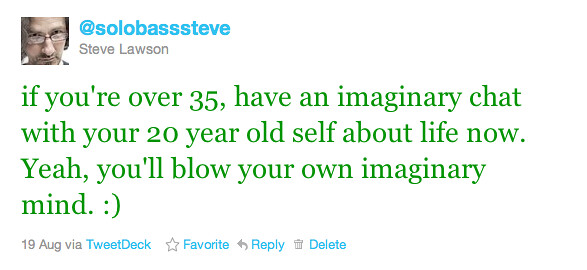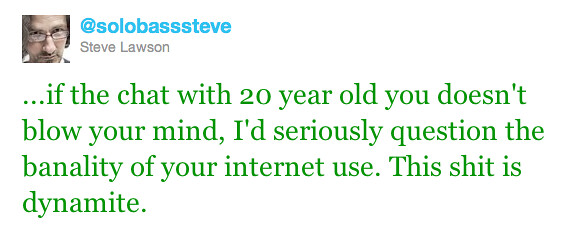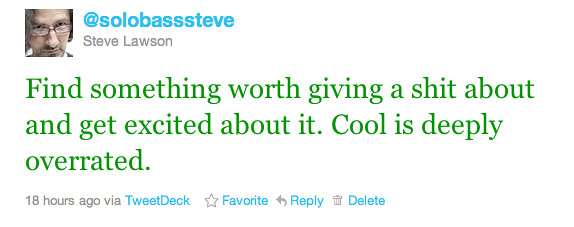OK, this post has come about through a few things. It’s a topic that comes to mind every time some numbnuts in government starts talking about how the internet causes riots, or the massive liars at the RIAA/BPI start ranting again about the evils of piracy and how the internet needs to be taxed or shut down, or whatever bullshit they’re peddling this month.
I tweeted a coupla thoughts over the last few days:
- If you’re over 35, have an imaginary chat with your 20 year old self about life now. Yeah, you’ll blow your own imaginary mind. 🙂
- …if the chat with 20 year old you doesn’t blow your mind, I’d seriously question the banality of your internet use. This shit is dynamite.
- Find something worth giving a shit about and get excited about it. Cool is deeply overrated.
The point being, we so often forget just what an astonishing revolutionary tool we have under our fingers as we type. Take a typical Facebook posting. You find something cool on YouTube – a song, a cat that dances, a kid throwing poo at a garden gnome – whatever, you post the link, which then plays the video whenever someone who you are friends with wants to see it. If they want to share it, they just hit the ‘like’ button and all their friends can see it. It’s not that uncommon for something shared in this way to be seen by millions of people. MILLIONS.
Cast your mind back to 1990. How would that work? You’ve got a great bit of video on your massive home movie recording beast, of a band that are great and unknown. What do you do? Any ideas?
If that comparison doesn’t still blow your mind, you’re either infinitely cooler headed than I am, or you’re suffering from a most severe case of awesome fatigue.
For us as musicians, the potential is SO mahoosive, it’s not even funny. Think of the synonyms for internet activity from 1990. Flyers, fan clubs, paper mail-outs, post-cards, posters, radio interviews, magazine ads, TV ads, pop videos (only shown on niche cable channels like MTV (still VERY niche in 1990 in the UK) or on about 4 hours of national broadcast stuff across all 4 channels in the UK.
No downloads, no email, no Twitter, no YouTube, no cheap short run CD pressing, no streaming gigs, not even the abomination of Myspace. Other than meeting people after gigs, or the occasional letter you received from an ardent fan (I’ve written, I think, 3 ‘fan letters’ in my life – to Nick Beggs, to the bloke that was playing with Mike Peters when I saw him play in Glasgow in ‘93, and to Jonatha Brooke).
Everything else was mediated by someone/something (radio/TV/Magazine/label) and expensive.
Now, scale that kind of reach to include all art, politics, education… human activity above and below the old clunky radar of the broadcast media… And we’re getting upset with the internet because some people downloaded some music without us having to pay for them to hear it???
This is old hat to some of you. The fact that it’s old hat doesn’t stop it being revolutionary. So much of our internet usage has come to reflect the banality of the big media it has the potential to replace. I don’t mean that small talk is bad. I love small talk. Most of my favourite Twitter follows are absurdists, amateur comedy writers who brighten my day. They’re just absurd in a way that reflects the potential of this medium for us all to be who we are without the need to please a commissioning editor. We as musicians no longer have any reason to write music with magazines and radio in mind – if they like it, bonus, but playing the guessing game of keeping the mediators happy was a losing proposition for the VAST majority of musicians who’ve ever gone that wrote.
No, we can, and do, make the music we love, make it available to people who might also love it, and invite them to share it around to other people who might love it. There’s a lovely similarity with the biblical parable of the sower – talking about where seeds land and what happens to them:
- We set our music free
- some people love it
- some think it’s OK but don’t get excited
- some are annoyed by it.
That’s all fine. It’s OK for people not to love my music. It’s easier for me to be OK about it when I haven’t spent £500 on an advert trying to convince people who don’t like it that they should.
The Internet – where you’re reading this – is amazing. More amazing than that. Think of a measure of amazingness then add ‘times a million’ to the end of it, and you’re getting close. But it’s not amazing at you, or for you. YOU are amazing WITH it. It’s participatory, and it’s amazingness is in the shared experience, the communion, the reciprocal serendipity of stumbling on great things via unexpected sources, and being grateful for it.
In that environment, paying for things is kind of obvious, sharing SAVES you a massive amount in promo costs, the production process becomes narrative and every fan is an advocate.
So, go and be amazing on the internet. Find something that blows your mind and get excited about it. If you love what I do, great, go tweet your friends about it, blog about it, facebook about it. If you don’t, find something else to talk about – a book, a film, your local MP, your kids doing life affirming weird things, a protest to join and share, an offline action to get involved in and then encourage others to do the same.
Then come back here and tell us how it went…




I totally agree. I’ve just finished reading about this, or actually listening. It’s the audio book Crush it! by Gary Vaynerchuk. garyvaynerchuk.com
Guess you might know about this book/audio book already. If not read it/listen to it. It’s great!
BTW It was nice meeting you at Wooten Woods in June. Great playin! Hope I’ll see you in Sweden soon! /magnus
Great post.
I think about this a lot. We’re some of the first people to be able to use this tool from anywhere at any time and do/read/listen to anything.
It’s only when something really inconcievable happens to you purely because of the internet that you get a mild reality check and really appreciate it for what it is.
Seriously good post, Steve. Inspired, inspiring.
Yes! Isn’t it wonderful!
I totally agree.
I set up a website about 10 months ago to publicise my writing. I have had over 10,000 hits. Now that may be small beer to some, but for me, just starting out, it is massively more than I could reach in other ways.
“it’s not amazing at you, or for you. YOU are amazing WITH it. It’s participatory, and it’s amazingness is in the shared experience, the communion, the reciprocal serendipity of stumbling on great things via unexpected sources, and being grateful for it.” – Such a well put and important point. I feel like a lot of the critics of “the internet”, broadly speaking, are critical of it as a selfish force, a tool for endless and useless introspection. We can post photos of ourselves! We can broadcast what we had for breakfast! We can Google ourselves! We’re so effed up and self-obsessed! But what’s infinitely more interesting, and infinitely more exciting, is, as you say, “the shared experience.”
I had this conversation with a friend of mine the other day. The internet is truly amazing, had someone told us about it when we were twenty we’d never have believed or imagined it possible to do half the things it can do.
Everyone thinks the Internet is killing culture… At least the people over 35 do!
The Internet is here to encourage SHARING. Sorry Metallica, sorry RIAA–this is the END of capitalism.
Hi Julian,
I don’t think ‘everyone’ thinks anything. C’mon, we can do better than that. Anecdotally, the smartest thinkers I know about the awesome disruptive potential of the internet are, by and large, over 35. Some of them are over 50. There’s no meaningful age split here. A lot of people across every age bracket are actually using the ‘free movement of culture’ argument to do the internet equivalent of kicking in the windows of their local JD Sports and grabbing some new trainers. In the grand scheme of things, it matters little, but it’s certainly not a case of ‘young people are making amazing cultural leaps forward on the internet and old people are regressive luddites trying to stop them’.
There are great thinkers at all levels, and idiots. The key thing is the challenge to each of us, as humans, to put more into this world than we take out, to live sustainably and deliberately, and to take seriously our part in making it viable for those who make the art we care about to continue making it in as radical and ‘prophetic’ a way as possible. If that’s what we care about. If it isn’t, we need to be realistic about the repercussions of the way we treat cultural ephemera and entity, and be willing to deal with the consequences of our actions.
Great post. Question, though: what should be done about copyright? Right now, the law is clear, but no one follows it, so what good is it? Personally, I think protections for intellectual property are important, but struggle with how to enforce them. As for my own album, I’ve opted to give it away because right now I would rather be heard than anything else.
Good Question Jeff – Copyright as it stands is pretty much unfit for purpose online. The word ‘enforce’ just doesn’t fit any imaginable correlation of digital entity and current copyright stipulation.
Newer kinds of license seem really helpful – Creative Commons is great, as it allows for non-commercial sharing, but gives legal protection when someone attempts to make money from your work (a vastly easier area to control, more so as the sums of money get larger…)
I think the big starter question is what do people actually pay *for* and why?
For some useful reading on the subject, I’d recommend James Boyle’s eBook, The Public Domain – see thepublicdomain.org for more.